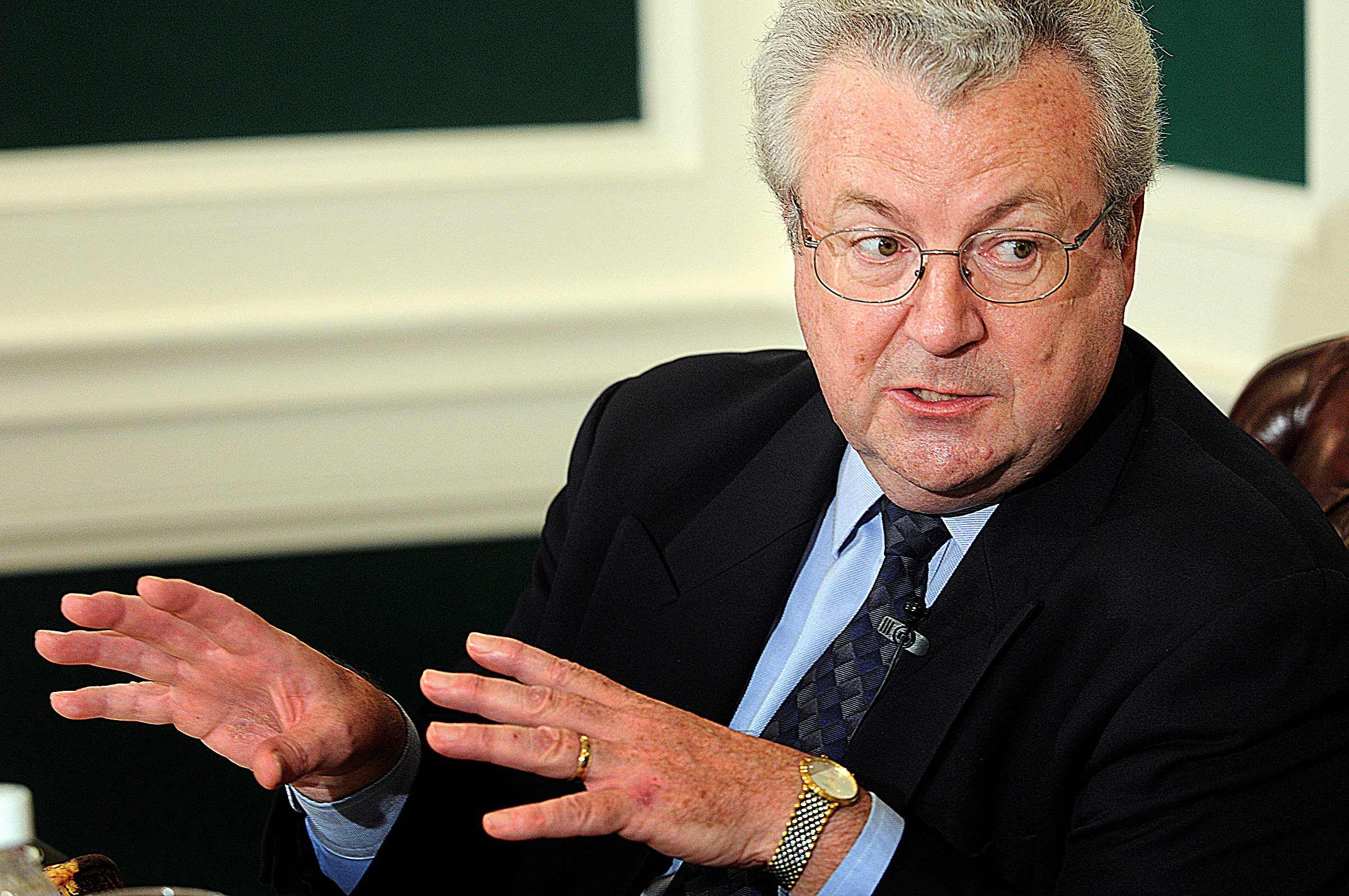In the weeks following the Gulf Oil spill, John Hofmeister made the rounds of talk shows serving as industry expert. He certainly had good credentials as Chairman of Citizens for Affordable Energy, and previously as President of the Shell Oil Company. Following BP Chair Tony Heyward’s statement that he “just wanted his life back,” the rest of the industry circled their wagons and went into blackout mode. Hofmeister’s ubiquity was in contrast to the rest of the petroleum industry. I was impressed with his outspoken opinions during his performances on Larry King and Meet the Press. Yet I was unconvinced. I was not ready to accept an oilman who claims he simply wants to “help America.”
The day before our interview, I attended his book-signing event in Charlotte. Hofmeister’s rumpled shirt and scholarly lecture to the handful of attendees reminded me more of a college professor than a petroleum heavyweight. His soft-spoken voice was sometimes drowned out by the screeches emanating from the bookstore’s indoor kiddie playground. After the event concluded, the Charlatan staff went out for a raucous dinner to compare notes. And while the opinions varied, everyone expressed some amount of skepticism. Why would a retired millionaire jet around to poorly attended book-signings? Conspiracies abounded. He’s a talking head for the petroleum industry! He must be making tons of money! He has a dirty soul from his years in the oil business and is now looking for redemption!
We met the next day in an ornate lobby of the Ballantyne Hotel. My goal was to learn more about his motives and uncover his “angle.” Class was in session again – this time his voice was overshadowed by the loud music. But after an hour of speaking with the unlikely oilman who grew up near Pennsylvania’s Dutch Country, I came to an odd conclusion. I may have discovered something more rarified than the Dodo bird: an honest oilman.
We don’t often see a retired oil company president go on to do benevolent tasks. Readers may be asking, “Why is he doing this? What’s in it for you?”
Well, I have been a political and social activist my whole life - let’s try to shape the future rather than be victimized by it. I grew up in the college years of the late 1960s. I felt that the nation was going through a particularly hard time with civil rights issues, environmental issues, and a war that nobody understood. I was always a political and social activist during my career as well – I was on the leading edge of change in the GE world under Jack Welch, in the Royal Dutch Shell world of changing for the 21st century. Shell had a chairman with a view that the Stone Age did not end for a lack of rocks, and the Oil Age would not end for a lack of oil. We ought to de-emphasize oil and emphasize gas, because gas has half the carbon content as oil. In the alternative space, we were working heavily in biofuels, wind, solar, and hydrogen. So we really took on a sustainability/social responsibility agenda. I got to be a part of that and thoroughly enjoyed it.
Since I retired at age 60, Shell expects its executives to leave at age 60 so that none of us hang around too long and become part of the furniture (laughing), I committed myself to starting a foundation called Citizens for Affordable Energy, which is a non-partisan education-oriented not-for-profit. We don’t lobby. We don’t take money from energy producers. We look after energy consumption, supply, technology, and environmental impact. We try to educate everyday Americans on what that means. Now, why am I doing this specifically? I am a grandparent and I’m concerned about their futures. I know a little more about energy that your average person. So shouldn’t I share that knowledge with people everywhere so that we can all face our future together? The future of energy in this country is in a perilous state and I think the American people deserve to know that.
I want to discuss the Gulf Oil Spill. What is your insider view?
I think there are four ways to talk about the Oil Spill. One, how did it happen? Is this an endemic, systemic problem in the industry, or is this a one-off? Everything we are finding out would suggest that this was a crisis created by one or more individuals who were going against best practice, standard industry custom, and were basically in violation of common sense. The history in the Gulf is 35,000 wells drilled safely, and 2,200 deep water wells drilled safely. So this to me was an anomaly predicated by human factors. Point two – I think that BP did everything humanly possible to try to close that well as rapidly as possible. They brought in the best minds in the industry. None of it worked. The third thing is that the cleanup is a disaster itself. The environmental degradation is a disaster, but the management of the clean-up is a secondary disaster. The government fell all over itself, not being willing to make decisions, not having people in charge who need to be in charge. And the fourth point, which is probably all-in-all the most important, what do we do about our future? If this was a human factor anomaly like a plane crash, then maybe we should keep doing what we’re doing which has worked for 40 years. If there are lessons that can be learned, however, let’s learn those lessons.
Is the industry guilty of arrogance for considering this an unthinkable event? Most people would think that a successful containment strategy ought to be the price of doing business.
That’s a very important question because it’s unacceptable what happened. Just unacceptable. But it’s also important to understand what did actually happen with the blowout protector that didn’t work. There are more than 30,000 blowout protectors that Cameron has manufactured without failures. The ultimate contingency plan to prevent blowouts is the blowout protector – and across the world, they work. Should there be something beyond that? That is what the API – a cross-industry panel – is now looking at from a technical standpoint. But there is a point where human factors overtake all of the best designs, all of the best regulations because we are imperfect creatures and we make judgment errors. I don’t know that that will ever cease in high-risk industries – whether it is in operating rooms where doctors make mistakes, cockpits where pilots make mistakes, coal mines where operators make mistakes, and drilling rigs. But if we’re gonna have coal, surgery, air flight and oil, then there is a certain amount of risk that is part of what we accept in pursuing those activities.
If you were still President of Shell, would you be looking at this as a buyer’s opportunity? Is the Oil Barron’s thinking, “This is a 150 billion dollar company, I can buy it for 70 billion”?
You are buying untold liabilities. You are buying things that might be anti-competitive in some markets. BP will have to sell assets to pay for the liabilities as well as raise money by selling bonds. They could get smaller as a result – that’s when they may be more vulnerable than right now. So it’s not going to be an easy road for them, and the Board may decide that it’s a better value for shareholders to consider a merger or a sale. But I don’t think that time is now. There are too many uncertainties. I probably would not be looking hard to acquire BP in its current state.
You make a point in the book that these type of events – whether the price spikes in 2008 or the spill – often spur a lot of rhetoric from Washington. Do you think this may be one of those Tipping Point events that spurs action?
(Laughing) I wish I could believe that, but I don’t. I think, for example, the moratorium was a terrible decision that will haunt President Obama when it’s time for re-election. I know there are East Coast and West Coast anti-drilling constituents of the White House. So the President is, in my opinion, not as worried about the constituents along the Gulf Coast being offended, because those states didn’t vote for him in 2008, and it’s unlikely they will vote for him in 2012. So, who cares? I think that’s politics at its worst. I’m sorry if that sounds too cynical, but I’ve seen too much of it. I see the politics of energy playing out over and over again and I don’t think it will solve the problem.
A few months ago I wrote that we had interest in Afghanistan to get to the energy resources in the former Soviet republics. Do you think there is legitimate concern that our continuous quest for energy overseas gets in the way of our foreign policy?
I believe there is a whole oil geopolitics body of thinking that completely supports your hypothesis. America’s interest in Middle East “peace” has more to do with security of energy supply than with any other factor. We suffered in the 1970s two oil embargos. We had promises from eight Presidents and eighteen Congresses that we would be pursuing energy independence. But really what we are pursuing is enough military might that we maintain peace and order in the world to get our energy supplies. So, I would say that we have done a very good at military preparedness and defending our national interests when it comes to energy supply, but we have done a horrible job of trying to create a domestic agenda to try to secure our own energy security.
In your book, Why We Hate the Oil Companies you say the concept of energy independence in America is a joke.
We imported 30% of our oil when President Nixon announced energy independence and 40 years later we are dependent 65% on imports. If that’s not a joke – and it’s a sad joke on the American people – by people we elect and pay to do a job. They have failed. The Congress has failed. The administrations have failed - both Republican and Democratic. They may be well-intentioned people but they can’t get their job done. Why? Because they can’t agree with each other.
You state that the Green Movement is led by “Global Warming Scaremongers” and that “Promoting Green jobs – wind, solar, and biofuels – as a new energy system for America is “fodder for unthinking herds.”
(Laughing) There’s no such thing as clean energy. Energy is destructive to land, water and air, no matter what kind of energy you are talking about. You either destroy a landscape, you destroy water systems, or you destroy the atmosphere. All forms of energy! The myth that energy is clean is what I refer to as “fodder for unthinking herds.” This whole notion of “Green Jobs” as if they are somehow better than brown jobs or yellow jobs or purple jobs? I think it is mythology, political symbolism, to have a positive effect because it’s new and different. Americans love what’s new and different. We love innovation.
You say “renewable energy will not be commercially competitive in your lifetime?”
Correct
If you don’t mind my saying, the actuaries would probably give you about 15 good years left (roar of laughter from JH). If not in 15 years, when does it become commercially viable?
For solar, we need to evolve the nanotechnology to where it is at least 30-50% efficient (we’re at 8 percent today). To me, that’s years and years away. And now that all Western Democracies are into serious deficit spending in order to keep their economies going, how much more government spending will be available to support wind and solar? Biofuels can’t compete with the volumes of oil that are available because nature only has one growing season in the United States per year. If we took all the food away, if we imported all our food – we still wouldn’t have enough arable land to produce the biofuels that are necessary to replace oil. These issues are far more complicated than superficial politicians promoting soundbites and convincing people that the soundbites are truth. I object to that. That’s an insult to the native intelligence of Americans to be led by soundbites, which is why we need a deeper understanding of what’s really going on here.
One thing you say that is working against the Green Movement is consumer apathy – whether its buying lightbulbs or electric cars – people don’t want to buck up extra money for something that they can get cheaper.
The fundamental issue is that clean costs more and people in this country are sensitive to how much money they have to spend. They don’t have a lot of disposable income. A lot of Americans don’t make that much money. I resent a group of well-paid elites deciding that we can somehow raise the price of energy to clean the environment because it’s best for the people of the nation. Since when does five percent of the people get to decide what 95% of the people must do in a democracy? I think it’s fundamentally an authoritarian approach, which is why average citizens need to know what is happening to them.
So let’s get to the proposal. How are you going to solve America’s energy problem?
Well, we have to fix the future. There is no question. We cannot go into an energy abyss. It would be devastating to our society, our economy, our national reputation and security. Congress can’t fix it. The White House can’t fix it. They’ve proven that. They don’t need any more time to prove they can’t do what they can’t do. I’m proposing the creation of an independent regulatory agency to manage the future of energy and the future of the environment as it relates to energy. It would have a Board of Governors like the Fed does, maybe 10-12 people with diverse backgrounds, people who have proven themselves in science, economics, manufacturing and energy production. Let them decide strategically what direction the country is going through presidential administrations, through Democratic or Republican majorities. We need a body that is independent of the politics of Congress, the politics of now, the flavor-of-the-day. I would say that in a country that has more energy than it will ever need that we are going to develop all of it so that we have affordability, availability and sustainability.
You tell an interesting story how you took this proposal on the 2008 campaign trail. For the major candidates, your proposal fell on deaf ears.
People running for office and who have the desire to govern, don’t want to give up what they are responsible to govern. What my proposal does is ask them, in the interest of the American people, to give up some of their governing responsibility so that we actually have an energy system that works, because we’re heading towards an energy system that doesn’t work, and its coming sooner rather than later. They are naturally opposed. However, in a representative democracy, there are times where you want to remind the elected who they work for. If the vast majority of American people want change in how their energy system is managed for the future good of the country and the security of their nation and the lifestyle and economic well-being of their legacy – their children and grandchildren – then we have to make changes. I think it’s ultimately the American people who would have the final say to their elected representatives of what needs to happen for our energy future. In order to do that, they need to know all that they can know. So my job now is to help them know with no bias towards a Republican or Democratic set of solutions but rather a completely comprehensive pragmatic centrist point-of-view. I’m not doing this for money. I’m not being paid. I’m not running for office. This is my time to serve in this capacity to try to solve our energy future once and for all.
With those bold words, Hofmeister penitently apologized that he had to finish up (although I had run over by 30 minutes). He was flying to Houston to meet with T. Boone Pickens. And as he raced to his rental car in the parking lot, I saw him tear off his tie and return to his signature rumpled look. Channeling fellow oilman Jed Clampett, he is a descent man with common values who was placed in an extraordinary position of power. And in our short time together, both at the public book signing and our subsequent private interview, Hofmeister had won me over. How unfortunate that his simple ideas are too practical for the politicians in Washington.
Archives










